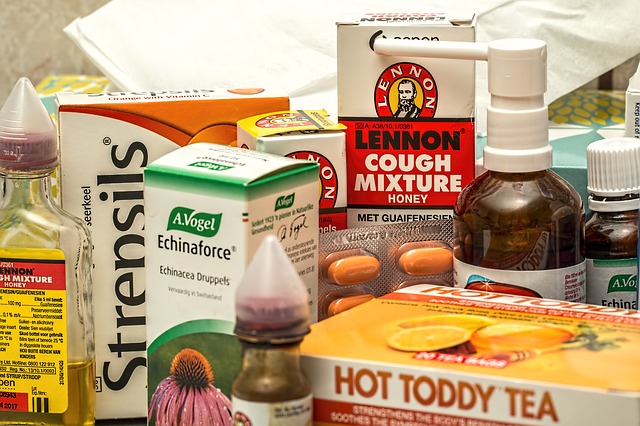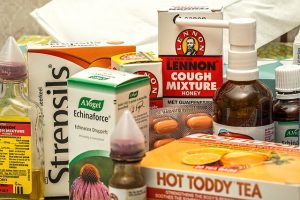Cough is a protective reflex, its purpose being expulsion of respiratory secretions or foreign particles from air passages. It occurs due to stimulation of mechano- or chemoreceptors in throat, respiratory passages or stretch receptors in the lungs. Cough may be useful or useless. Useless (nonproductive) cough should be suppressed.
Useful (productive) cough serves to drain the airway, its suppression is not desirable, may even be harmful, except if the amount of expectoration achieved is small compared to the effort of continuous coughing. Apart from specific remedies (antibiotics, etc. see box), cough may be treated as a symptom (nonspecific therapy) with:
1. Pharyngeal demulcents
- Lozenges,
- cough drops,
- linctuses containing syrup,
- glycerine,
- liquorice.
2. Expectorants (Mucokinetics)
Expectorants thin mucus so it’s cleared more easily out of the airways. They also soothe mucous membranes in the respiratory tract. The result is a more productive cough.
(a) Bronchial secretion enhancers:
Sodium or Potassium citrate, Potassium iodide, Guaiphenesin (Glyceryl guaiacolate), balsum of Tolu, Vasaka, Ammonium chloride.
(b) Mucolytics:
Mucolytics act directly on mucus, breaking down sticky, thick secretions so that they’re more easily eliminated
Bromhexine, Ambroxol, Acetyl cysteine, Carbocisteine
3. Antitussives (Cough centre suppressants)
(a) Opioids:
Codeine, Ethylmorphine, Pholcodeine.
The opioid antitussives (typically codeine and hydrocodone) are reserved for treating an intractable cough.
(b) Nonopioids:
Antitussive drugs suppress or inhibit coughing.
Types of antitussives
Antitussives are typically used to treat dry, nonproductive coughs. The major antitussives include:
• benzonatate
• codeine
• dextromethorphan
• hydrocodone bitartrate.
Noscapine, Dextromethorphan, Chlophedianol.
(c) Antihistamines:
Chlorpheniramine, Diphenhydramine, Promethazine.
(d) Peripherally acting:
Prenoxdiazine.
4. Adjuvant antitussives
Bronchodilators: Salbutamol, Terbutalin.


